PSE MARK
Services For Electronic Devices
Ensure Japanese market access with PSE MARK
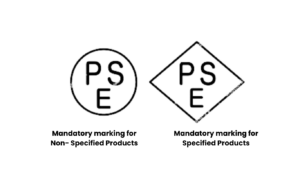
Understanding PSE Mark
The PSE (Product Safety Electrical Appliance & Material) mark is a must-have for many electrical and electronic products in Japan. It shows that these products meet the standards set by the Electrical Appliance and Material Safety Law, ensuring they’re safe and reliable.
Products Requiring PSE Mark
There are two categories of products that require a PSE Certificate:
Category A, known as Specified Products, includes items like single-phase small power transformers, heating appliances, motor-operated appliances, and electronic appliances. Category B, referred to as Non-Specified Products, encompasses household electrical products such as rice cookers, curling irons, and television receivers.
The certification process involves evaluating the safety and EMC characteristics (from 17025 accredited and METI designated labs) of the products to ensure compliance with technical requirements. For Category A, electrical appliances, an evaluation of the manufacturer’s factory facility is also conducted.
Category B Products, which have lower risks, follow a self-declaration scheme and are labelled with the PSE Circle Mark. Products must show compliance with both safety and EMC (from 17025 accredited labs).
PSE Diamond Mark
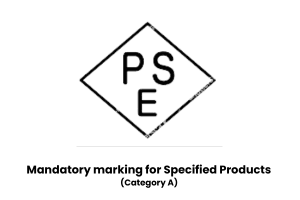
Category A products that pose higher risks can be affixed with the PSE Diamond Mark after successfully obtaining mandatory certification. The Diamond PSE Mark has a validity period of 3, 5, or 7 years, depending on the classification. The test lab used for Category A appliances must be registered by METI, either locally or overseas, and must adhere to both safety and EMI test standards.
The factory undergoes an initial inspection, but periodic inspections are not required. The license for the PSE Diamond Mark must be issued to a Japanese company, and only one factory is permitted to be displayed on the PSE certificate.
Some of the Category A Products are:
AC/DC power supply
Electric pumps
Electric sauna baths, etc.
For the full list of Category A Products, please refer to the link here: Specified Products
PSE Circle Mark
The Circle Mark has a validity period of 3 years.
Category B products must be tested according to Japanese or IEC standards with Japanese deviation. These can be tested by the manufacturer if they have the necessary capabilities, or by any third-party test lab.
Some of the Category B Products are:
- Electric toasters, ovens
- LED Lamps
- Remote Control Relays, etc.
For the full list of Category B Products that require PSE Certificate, please refer to the link here: Non- Specified Products
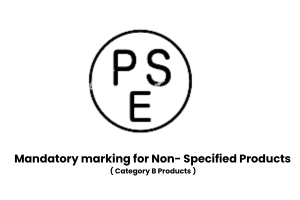
Process for the Sale of PSE Products
The following flowchart provides an overview of the key steps involved in PSE certification
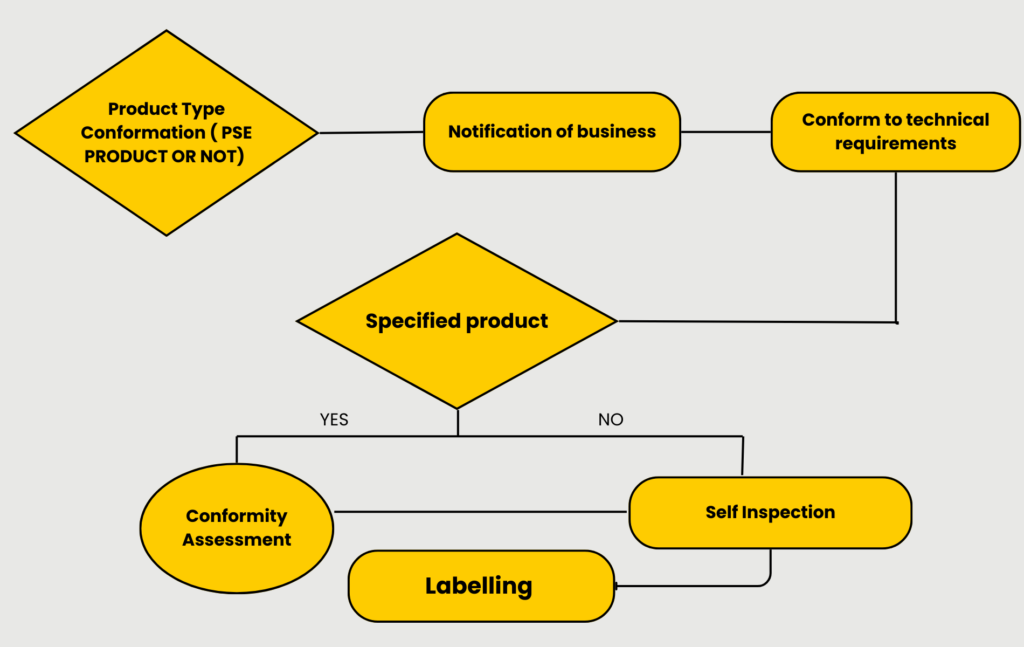
Responsibilities of manufacturers and importers
- Importers must officially notify METI before importing electrical equipment regulated under the PSE Law.
- Specified Electrical Products require third-party conformity assessment and PSE Certification, while Non-Specified Electrical Products does not need to do conformity assessment but can obtain voluntary S-JQA certification.
- All products must undergo final compliance checks prior to shipment and retain records
- Notifying suppliers/manufacturers have fulfilled the obligations related to regulations required before
distribution, they should use the marking (or <PS> E) or (or (PS) E) to products - Overseas manufacturers can register their products at METI with one condition: overseas manufacturers must designate a Domestic Administrator in Japan as a contact point for METI.
Related Services
Click here to know about the Approval Process for the Canadian Market
Click here to know about the SRCC certifications
Click here to know everything about European Type Approval
Click here to know everything about Type Approval for Fiji
Click here to know everything about Type Approval for Hong Kong
Click here to know everything about India Approvals
Click here to know everything about PSE Mark
Click here to know everything about MIC Certificate
Click here to know everything about Type Approval for Malaysia
Click here to know everything about Type Approval for Russia
Click here to know everything about Type Approval for Saudi Arabia
Click here to know everything about Type Approval for South Africa
Click here to know everything about Type Approval for Singapore
Click here to know everything about Type Approval for South America
Click here to know everything about Type Approval for South Korea
Click here to know everything about NCC Certificate
Click here to know everything about BSMI Mark
Click here to know everything about Type Approval for USA
Company Strengths at a glance
Why C-PRAV?
Beyond a conventional certification service, C-PRAV offers extensive support and advice tailored to your unique needs of Japanese PSE approvals for both Category A & Category B. C-PRAV can support you for any EMC, Safety Testing and Certification needs for Japanese regulatory compliance.
Comprehensive Support
We will guide and manage the complete certification process
Tailored Insights
We provide guidance and assistance in completing the application documents for PSE certification.
Cost-Effective Solutions
We recognize that every product is unique, which is why we specialize in customizing compliance strategies to perfectly align with your specific needs and budget. Our comprehensive, end-to-end service is designed to be cost-effective while delivering exceptional results
Ask Us Anything
For PSE Mark certification, local representation may not be explicitly mandatory, but it can significantly facilitate the certification process, especially for foreign manufacturers.
For High risk products that fall under specified list, testing should be done by a METI accredited lab
The “Diamond PSE” mark is used for Specified Electrical Appliances (Category A) and indicates stricter regulatory requirements, including mandatory third-party testing and certification. The “Round PSE” mark is for Non-Specified Electrical Appliances (Category B) and generally requires self-declaration of conformity by the manufacturer.
Certain low-voltage products and small electrical components may be exempt from the PSE mark requirement.
In Japan, the Product Safety Electrical Appliance and Materials (PSE) mark is the primary safety certification required for many electrical and electronic products. However, having other international safety certifications does not automatically exempt products from needing the PSE mark for sale in Japan.
Yes, the PSE mark is required for both domestically manufactured and imported electrical products that fall under the scope of the Electrical Appliance and Material Safety Law
Regulatory Updates for japan
Japan Proposes Radio Act Amendment Affecting TPMS and RKE Devices
Japan’s Ministry of Internal Affairs and Communications (MIC) has notified a proposed partial amendment to the Ordinance for Enforcement of the Radio Act under WTO
Japan Launches JC-STAR Cybersecurity Labeling for IoT Products
japan’s Ministry of Economy, Trade and Industry (METI), in collaboration with the Information-technology Promotion Agency (IPA), has introduced the JC-STAR program—short for Japan Cyber-Security Technical
Japan MIC introduces guidelines for use of US and EU standard for 2.4GHz band wireless LAN
Japan’s Ministry of Internal Affairs and Communications (MIC) has issued guidelines regarding the utilization of test data from US and European standards for the 2.4GHz
